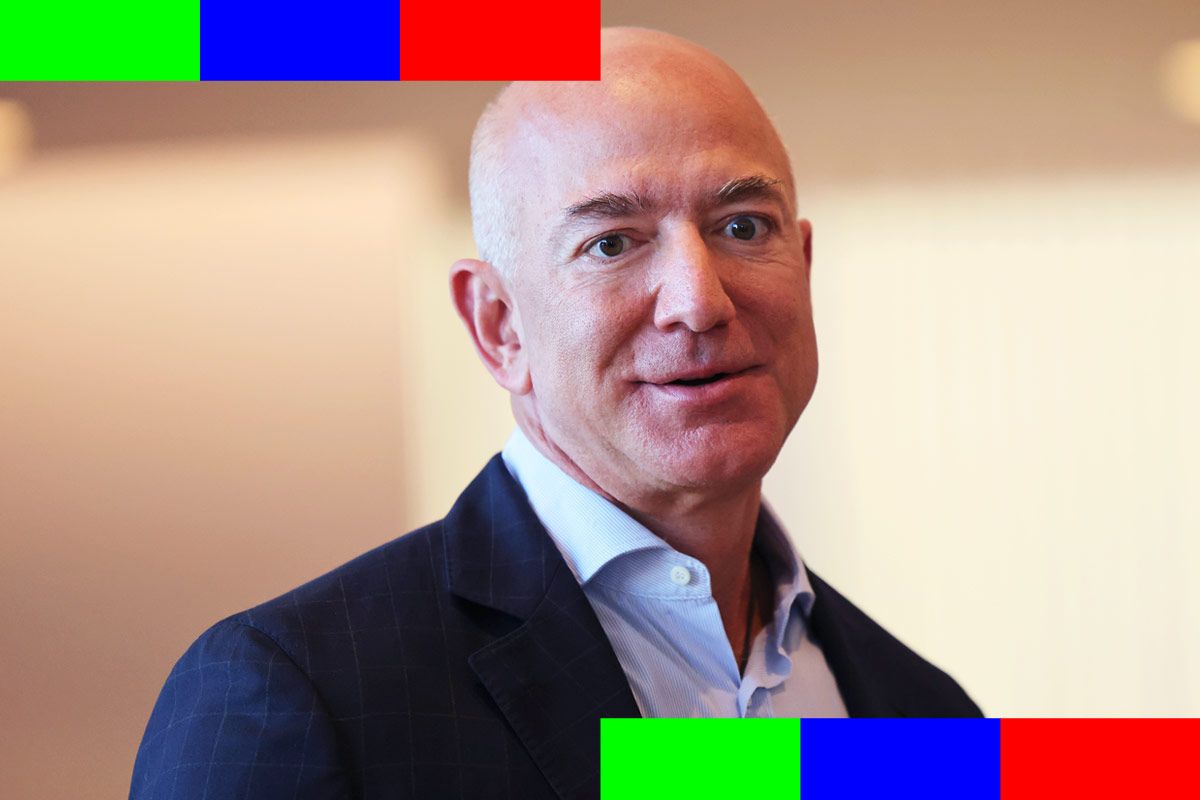 Ted Lasso wraps its second season tomorrow, and you can count me among those who think the show has gotten even better during its sophomore year. I havenât watched the finale yet because, even though Apple TV+ gives reporters advanced access to screeners, I chose to watch week-to-week in order to extend the serotonin boost I get from every installment of the series. To binge or not to binge is the question that kicks off this weekâs Buffering, and no, we wonât be exploring my personal viewing preferences, but rather whether the streaming industry is any closer to figuring out the best way to release new content to customers. Also this week: Jeff Bezos reveals he loves Squid Game (and maybe this newsletter?) and why Adeleâs search for a TV home says a lot about the lingering strength of broadcast TV. Thanks for reading. âJoe Adalian |
 |  | | Photo-Illustration: Vulture; Photos by Hulu and Netflix | | |
| The TV industry has been debating the wisdom of Netflixâs binge release model since that Super Bowl weekend back in 2013 when the streamer dropped the entire first season of House of Cards all at once. Netflix argues its approach is best because it prioritizes customers, and that younger audiences in particular want to feast on big batches of content all at once rather than have episodes spoonfed to them over a few months. Hollywoodâs old guard makes the case that tossing out a full season in one day dramatically shortens a showâs pop-culture half-life and makes their art feel disposable. So whoâs right? The smashing success of two recent releases â Netflixâs Squid Game and Huluâs Only Murders in the Building â makes a case that maybe it really doesnât matter. |
| As this newsletter detailed last week, Squid Game took the world by storm within just a few days of its first nine episodes hitting Netflix, and three weeks later thereâs no sign of the buzz surrounding the show dying down; itâs arguably still gaining momentum. The growing interest in the show is happening even though Netflix hasnât released a single new episode since September 17. If anything, Netflixâs binge model may actually be working to Squid Gameâs advantage because it allows the streamer to create a sense of urgency among its members and stoke the flames of FOMO. Folks who hear what a wild, twisty ride Squid Game offers have an incentive to watch and finish season one as quickly as possible so as to not have any part of the journey spoiled. Plus, because thereâs so much content so quickly, it allows for more memes to sprout up quickly and for fandoms around various characters to almost instantly take root. |
| And yet over on Hulu, Only Murders, which debuted 18 days before Squid Game, has been having an impressive run of its own via a modified episodic release. Hulu dropped the first three episodes of the show on August 31, and per Nielsen, the Steve MartinâSelena GomezâMartin Short dramedy was an instant hit. The ratings giant says the initial 97 minutes Hulu made available to stream accumulated 444 million minutes of viewing in the U.S. during its first week on the service. That put it in the top five for the week among streaming originals, and compared favorably with the average per-minute consumption a week earlier for the Netflix drama Clickbait,which debuted with eight roughly 45-minute episodes. |
| But hereâs where Huluâs weekly approach has paid off: Parrot Analytics, which measures audience demand for streaming content around the world, says Only Murders has gone from being the 99th most in-demand show in America a week after its debut to the 19th most in-demand show on September 29, the day after its much-lauded episode âThe Boy From 6Bâ debuted. The showâs global performance has been even stronger, with Only Murders ranking as the 15th most in-demand show around the world at one point last week. Another third-party measurement site, Ranker, is also seeing strong numbers for the series. For the month of September, Only Murders came in at No. 4 on the companyâs âwatchworthyâ index, which measures audience interest in shows based on how often users of Rankerâs app engage with a title through searches, trailer views, watchlist adds, and other interactions. About 88 percent of all users have favorable sentiments toward the show. |
| Now, by all available metrics, Squid Game and Only Murders arenât in the same league in terms of overall cultural impact right now; the Netflix series is a juggernaut. But both are managing to get more popular every week despite being released in very different ways, and I donât think each platformâs distribution strategy has made much of a difference one way or the other. Sure, the FOMO factor is definitely getting more eyeballs on Squid Game more quickly, but had Netflix released only the first episode of the series on September 17, Iâm guessing the online reaction would have still been massive and prompted viewers to see what the fuss was all about, while the twists in subsequent episodes would have kept that buzz going. |
| Similarly, Only Murders is such a well-structured, endlessly surprising journey, and the star power attached to the show is so dazzling, that the raves about the series likely would have resonated for weeks or even months after a hypothetical binge release. And once awards season kicked off in December and January, the din around the series would have picked up again. A binge model might have made it harder for Hulu to pull off the clever episodic promotions itâs been doing on behalf of Only Murders âlike the gaggle of Tie-Dye Guys the streamer unleashed all over New York a few weeks ago â but I donât think the show wouldâve fallen through the cracks at all. |
| The fact is, although the episodic and binge models both have their advantages and downsides, I have yet to see any data proving one strategy is definitely and consistently better than the other. Episodic stans point to Ted Lasso as the ultimate example of how a weekly release can build momentum for a show, but while the Apple TV+ absolutely got more popular over the course of its eight-week initial run in summer 2020, Iâd be willing to bet its biggest overall audience growth came in the months following its season-one finale â you know, when people started bingeing all ten episodes. On the other hand, the episodic model for Ted has helped fuel weeks of discussion and debate around the series this season, a conversation that almost surely wouldâve come and gone within two weeks had Apple done a Netflix and put them all out at once. It also probably boosted the showâs Emmy campaign, which paid off with several spectacular wins last month. |
| If I sound pretty indecisive about the whole binge-versus-episodic debate, well, itâs because I actually am â and I think streamers should be similarly agnostic. Netflixâs introduction of the binge model represented a fundamental shift in TV, and I think it was massively important to the streamerâs early success. It put customer satisfaction ahead of a short-term need to keep audiences engaged longer by stringing out a showâs run over a few months. And even now, I think most consumers, even ones like me who actually do like watching episodes once a week, greatly value being given a choice in the matter. For series with complicated storylines, being able to get through a serialized plot is a lot easier to do when you donât have to wait a week in between episodes. I donât know, for example, that Apple TV+ is doing The Morning Showâs second season, or Foundationâs first, any favors by having them unspool over three months. Same goes from FX on Huluâs dense, multilayered sci-fi yarn Y: The Last Man. |
| At the same time, as Netflix moves into every form of TV imaginable, its dogmatic belief that (almost) all shows must be binged doesnât always serve viewers well. Procedural dramas and multi-camera comedies thrive when audiences are deeply invested in relatable characters viewers want to return to again and again, in some cases almost like family. Shows such as Greyâs Anatomy or Friends are deeply enjoyable as a binge, but they thrived because Meredith and Chandler and Joey and McDreamy were weekly fixtures in folksâ lives for literally hundreds of episodes, spread out over a decade or more. |
| Netflix is trying to get those kinds of ânetworkâ-y shows to work on its platform, which is why it snatched up Lucifer from Fox and rescued Emily in Paris from TV Land (where it was originally supposed to complement Younger). Why not have a handful of scripted shows on Netflix that air weekly in ten-episode batches, allowing audiences to develop a habit the way they did for decades on network TV? Were Netflix to give these shows their own branding, I donât think it would hurt the streamerâs image as the home of the binge. Itâs already successfully experimented with teasing out some of its reality shows over several weeks, and many U.S.-made series run weekly on Netflix in other countries. If Netflix is serious when it says it wants to give members choice, why not give them the choice to enjoy some TV shows in a more traditional way? |
| Is the Weekly Model Winning Out? |
| One final thought: Despite vocal debates online and among some analysts, the streaming industry clearly seems to be gravitating toward the episodic approach to releasing new episodes. Thatâs a bit surprising, because after House of Cards became an immediate breakout hit, it seemed for a minute as if Netflixâs rivals were going to fully embrace its binge model. Amazon Prime Video, which had used an episodic release for its first big comedy series, Alpha House, in April 2013, switched to binge for season two following the success of Cards, and then started releasing almost all of its originals that way. Hulu also started flirting with the binge route for a year or two in the mid-2010s, shifting the second seasons of drama East Los High and comedy Quick Draw to the all-at-once model. |
| But as it turns out, the episodic TV model pioneered back in the 1950s has proven surprisingly hard to kill. While Hulu has continued to release most pure comedies as binges, almost all of its dramas and limited series get doled out week to week. And as newer platforms such as Disney+, Apple TV+, HBO Max, Peacock, and Paramount+ have signed on over the past two years, they too have favored episodic as their standard release pattern, particularly on the drama side. Even Amazon seems to be shifting back a bit to episodic: Megahit The Boys came out as a binge for season one but went episodic for season two. |
| Enjoying Buffering? Share this email with your network or sign up to get the newsletter in your inbox every week. |
| Earlier this week, I wrote about how Adeleâs reps and her partners at Sony Music have been talking to TV platforms about a big TV special linked to her upcoming (and long-awaited) album release. Lots of places would obviously be interested, and as of Thursday morning, I still havenât heard where the project is landing. But whatâs interesting to me is that despite streaming having clearly eclipsed linear TV in terms of buzz and cultural resonance, broadcast outlets are still very much in the conversation when people are trying to sell a product or move public opinion. Local TV stations billed political campaigns billions for ad time during last yearâs election, and when Meghan and Harry wanted to tell their story, they did an Oprah special on CBS and not Apple TV+, where the once and forever queen of talk has an overall deal. |
| And now, with one of the biggest singers in the world figuring out how to promote her return after a long absence, her team hasnât ruled out broadcast as a key sales tool. Two industry insiders I spoke to this week told me that these days, artists looking to make bank will almost always choose streaming because the paychecks are huge and the upside is guaranteed. Without getting into specific artists or platforms, Iâve heard the biggest names in music can command between $15 million and $20 million for a streaming special or music film. By contrast, a network TV concert usually involves an artistâs record label spending some of its own money on the special, and the singer accepting dramatically less cash upfront, since networks usually canât justify spending so much on a one-time-only event. |
| So why even go the network route? Well, profit can still be made in the long-term by selling a version of the special on DVD or digital download, and by selling the streaming rights at a later date. But the real appeal of traditional TV is reaching a ton of potential album buyers very quickly in a way that, until very recently, a streamer couldnât match. That calculus could be changing, however: As one insider pointed out, Netflix and Prime Video and the Disney bundle reach a lot of folks every day, and as Squid Game underscores, they can now get a lot of eyeballs on something very quickly, too. We should know soon which way Adele & Co. decide to go. |
| It happened this week â letâs talk about it.
Sign up for My Week in New York: a new newsletter from the editors. |
 |  | | Photo-Illustration: Vulture; Photo by Michael M. Santiago/Getty Images | | |
| Amazon founder and former CEO Jeff Bezos caused a bit of a stir online over the weekend when he took to Twitter to publicly congratulate two fellow moguls, Reed Hastings and Ted Sarandos, for the breakout hit Squid Game. âTheir internationalization strategy isnât easy, and theyâre making it work. Impressive and inspiring,â the businessman/astronaut gushed. Bezos also linked to last weekâs Buffering and our deep dive into Squidâs success â which, yes, was admittedly kinda cool. (I donât know if youâre a regular reader, Jeff, but if you are, feel free to call, text, email, or hijack my Alexa any time you want to sound off on the state of streaming.) |
| Since Amazonâs Prime Video service competes with Netflix for attention and projects, more than a few folks on Twitter reacted with surprise to the Bezos tweet, with a few even wondering aloud â maybe jokingly? â whether it meant some sort of merger was in the works. Look, I long ago stopped saying anything was impossible, but given that Amazonâs purchase of MGM isnât even considered a slam dunk to make it through the regulatory process, I canât imagine any sort of Amazon-Netflix nuptials getting the governmentâs blessing as long as Joe Biden is president and Elizabeth Warren is in the Senate. Plus, the fact is, this isnât the first time Bezos has used his social-media accounts to send a Valentine to Team Netflix: Back in the summer of 2019, he kvelled about season three of Stranger Things on Instagram, even posting a photo of some Eggos for good measure. |
| Thereâs also a long history of powerful TV people being publicly nice to each other, whether itâs broadcast network chiefs answering questions about which shows from their rivals they wish theyâd green-lit, or the trade ads companies buy when one of their rivals gets some made-up honor. I think in this case, Bezos was simply feeling magnanimous. (And for the record, he quickly insisted he had no ulterior motive with his tweet. âJust simple admiration,â he wrote.) |
| |
|





